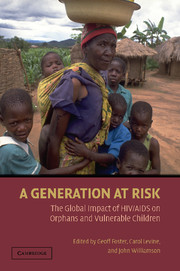Book contents
- Frontmatter
- Contents
- Foreword
- Preface
- Contributors
- Introduction: HIV/AIDS and Its Long-Term Impact on Children
- 1 Family and Community-Based Care for Children Affected by HIV/AIDS: Strengthening the Front Line Response
- 2 Strengthening Households and Communities: The Key to Reducing the Economic Impacts of HIV/AIDS on Children and Families
- 3 The Response of the Educational System to the Needs of Orphans and Children Affected by HIV/AIDS
- 4 Psychosocial Impact of the HIV/AIDS Epidemic on Children and Youth
- 5 Human Rights and Children Affected by HIV/AIDS
- 6 Religion and Responses to Orphans in Africa
- 7 Making the Right Choices in the Asia-Pacific Region: Protecting Children and Young People from HIV and Its Impacts
- 8 Troubled Tapestries: Children, Families, and the HIV/AIDS Epidemic in the United States
- 9 Interventions to Support Children Affected by HIV/AIDS: Priority Areas for Future Research
- 10 Finding a Way Forward: Reducing the Impacts of HIV/AIDS on Vulnerable Children and Families
- Chronology of Important Events
- Resource Guide
- Index
- References
6 - Religion and Responses to Orphans in Africa
Published online by Cambridge University Press: 05 June 2012
- Frontmatter
- Contents
- Foreword
- Preface
- Contributors
- Introduction: HIV/AIDS and Its Long-Term Impact on Children
- 1 Family and Community-Based Care for Children Affected by HIV/AIDS: Strengthening the Front Line Response
- 2 Strengthening Households and Communities: The Key to Reducing the Economic Impacts of HIV/AIDS on Children and Families
- 3 The Response of the Educational System to the Needs of Orphans and Children Affected by HIV/AIDS
- 4 Psychosocial Impact of the HIV/AIDS Epidemic on Children and Youth
- 5 Human Rights and Children Affected by HIV/AIDS
- 6 Religion and Responses to Orphans in Africa
- 7 Making the Right Choices in the Asia-Pacific Region: Protecting Children and Young People from HIV and Its Impacts
- 8 Troubled Tapestries: Children, Families, and the HIV/AIDS Epidemic in the United States
- 9 Interventions to Support Children Affected by HIV/AIDS: Priority Areas for Future Research
- 10 Finding a Way Forward: Reducing the Impacts of HIV/AIDS on Vulnerable Children and Families
- Chronology of Important Events
- Resource Guide
- Index
- References
Summary
The bread in your cupboard belongs to the hungry man; the coat hanging unused in your closet belongs to the man who needs it; the shoes rotting in your closet belong to the man who has none; the money which you hoard in the bank belongs to the poor. You do wrong to everyone you could help but fail to help.
– Saint Basil the Great, fourth centuryFor centuries, religious groups have proven their sustainability and resilience through their continuous presence in societies. Members of religious organizations have demonstrated their commitment to respond to human need based on the teachings of their faith, and they do so voluntarily and over long periods. They have continued to respond in the face of conflict, natural disaster, political oppression, and disease. Faith-based organizations (FBOs), addressing the universal need for community and spiritual life, endure for the long term when others tire, drop out, or shift energies to other crises. As HIV/AIDS continues to create a “caring deficit,” eroding the capacity of communities to care for those affected, religious organizations will be crucial in responding to the impact of the disease and in promoting a caring mentality and sustaining hope.
During the past decade, religiously motivated individuals and organizations throughout Africa have developed responses to care for growing numbers of children affected by HIV/AIDS. The strength of religion in Africa is fundamental to the resilience of its responses to orphans and vulnerable children.
- Type
- Chapter
- Information
- A Generation at RiskThe Global Impact of HIV/AIDS on Orphans and Vulnerable Children, pp. 159 - 180Publisher: Cambridge University PressPrint publication year: 2005
References
- 3
- Cited by



